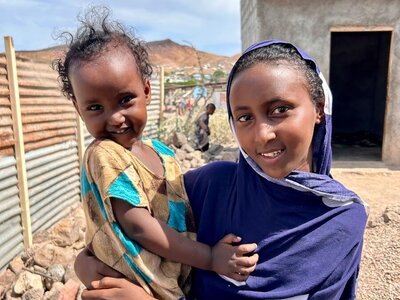Djibouti
- 24%
- of people need food assistance
- 90%
- of food is imported
- 1.1 million
- population
With a population of 1.1 million, The Republic of Djibouti is a middle-income country in the Horn of Africa. Despite this, it ranked 93 out of 125 countries in the 2023 Global Hunger Index, with a severity score categorized as “serious”.
The climate is hot and dry, which limits agricultural production. Livestock production contributes only three to four percent to GDP, leading the country to import 90 percent of its food. This makes it vulnerable to price fluctuations, which directly affect the purchasing power of low and middle-income rural households – especially those headed by women.
A multisectoral survey in 2024 showed a 14.7 percent global acute malnutrition rate, against 13 percent in 2023. This has its roots in structural poverty, insufficient access to water for agropastoral activities, lack of basic services such as health, education, and water and sanitation, inadequate social safety nets, limited employment opportunities, and the effects of the influx of refugees and migrants.
Djibouti port is the principal transit point for cargo in and out of Ethiopia and a key link in commercial transport routes to and from the greater Horn of Africa.
To enhance efficiencies in both humanitarian and commercial logistics, the World Food Programme (WFP), with support from the Government, established the Humanitarian Logistics Hub in Djibouti. This can store up to 65,000 metric tons of food and goods for operations in the region.
WFP has been in Djibouti since 1978, providing humanitarian food and nutrition assistance to vulnerable populations. We focus on social protection, human capital and improving resilience, with the ultimate goal of eradicating hunger.
What the World Food Programme is doing in Djibouti
-
Assistance to refugees
-
WFP provides monthly mixed cash-food or cash-based transfers to refugees and asylum seekers in the three settlements located in northern and southern parts of the country. Most refugees have limited or no income, and therefore rely almost exclusively on WFP’s food assistance. Pregnant and breastfeeding women and girls, as well as children aged under 5, also benefit from nutrition programmes such as the prevention of chronic malnutrition, and nutrition supplementation for those suffering from moderate acute malnutrition.
-
Food security for crisis-affected populations
-
Nutrition
-
Resilience building
-
School meals
-
Humanitarian Logistics Base
-
United Nations Humanitarian Air Services
Djibouti news releases
Go to pageFind out more about the state of food security in Djibouti
Visit the food security analysis pageOperations in Djibouti
Contacts
Office
P.A.M., Rue Ibrahim M. Sultant, Heron B.P. 10011 - Djibouti République de Djibouti,
Djibouti
Djibouti







